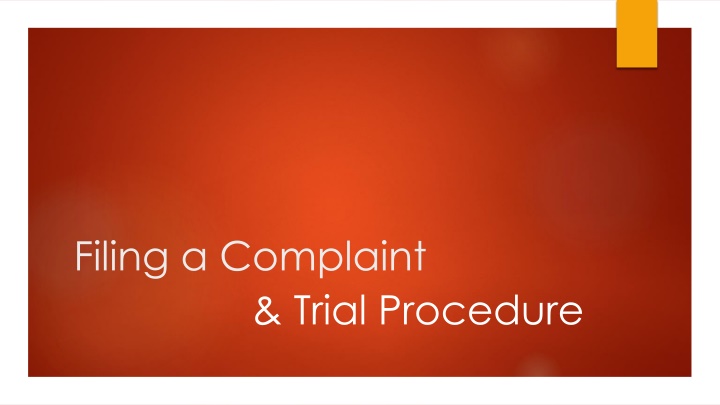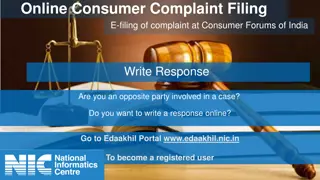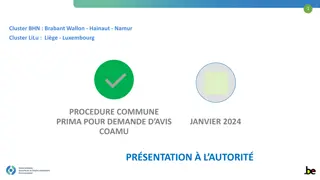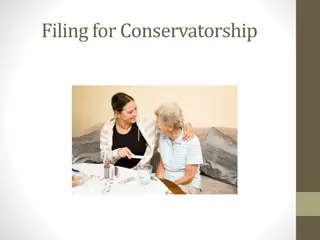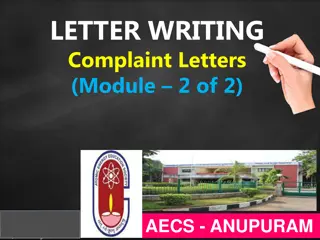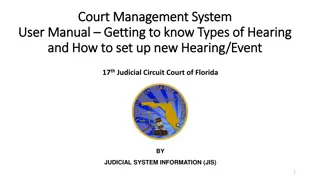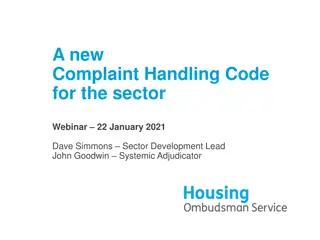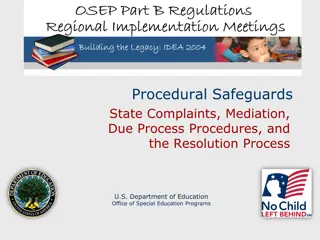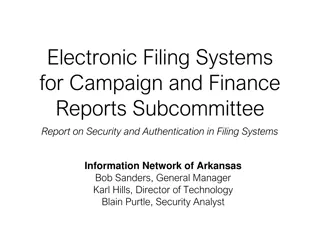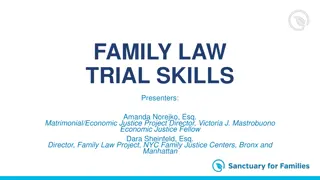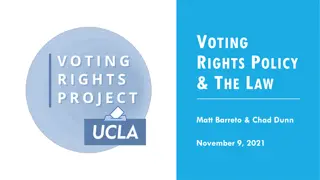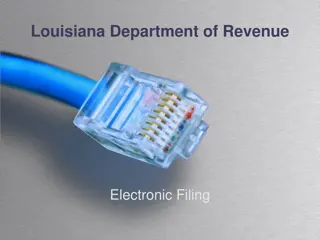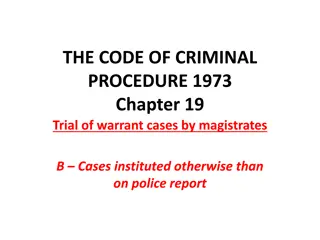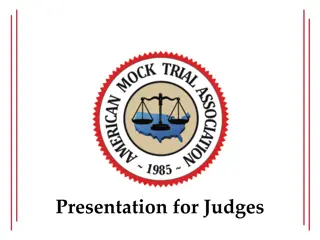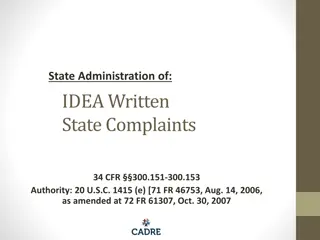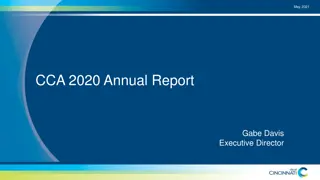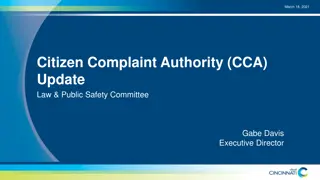Filing a Complaint & Trial Procedure
Any member in good standing in an Aerie or Auxiliary may file charges against another member for an offense committed. Learn about who may file a complaint, completing the complaint form, filing procedures, and the role of the Trial Committee in the trial process.
Download Presentation

Please find below an Image/Link to download the presentation.
The content on the website is provided AS IS for your information and personal use only. It may not be sold, licensed, or shared on other websites without obtaining consent from the author.If you encounter any issues during the download, it is possible that the publisher has removed the file from their server.
You are allowed to download the files provided on this website for personal or commercial use, subject to the condition that they are used lawfully. All files are the property of their respective owners.
The content on the website is provided AS IS for your information and personal use only. It may not be sold, licensed, or shared on other websites without obtaining consent from the author.
E N D
Presentation Transcript
Filing a Complaint & Trial Procedure
Any member in good standing in an Aerie or Auxiliary may file charges against any other member of the Aerie or Auxiliary for an offense committed against the Laws of the Order. Section 63.1
Who May File A Complaint? Any member in good standing in an Aerie or Auxiliary may file charges. An Auxiliary member does NOT have to go through the conciliation process prior to filing a Complaint against another Auxiliary member. A member serving a social room suspension is still a member in good standing and may file a Complaint. A member serving a membership suspension is NOT a member in good standing, and MAY NOT file a Complaint until the time of suspension has passed.
Completing the Complaint Form A proper Complaint, as set forth in Section 63.1 (b): must be signed by the Accuser must set forth the facts and circumstances with the date and place must include the particulars of the occurrence of the alleged offense in concise form and with reasonable certainty must be filed within ninety (90) days after the commission of the offense, except there shall be no time limitation for filing charges for offenses involving fraud
Filing the Complaint The completed, signed Complaint shall be filed directly with the Worthy President, or presiding officer, and directly with the Trial Committee Chairman of the Aerie to which the Accused is a member, and shall be accompanied by a copy of the receipt showing the filing fee has been paid The $25 filing fee is to be paid directly to the Aerie Secretary of the Aerie to which the Accused is a member; if a Board of Trustees is the Accuser, the filing fee is waived It is recommended that the Accuser keep a copy of the Complaint for his/her records and requests the Worthy President and Trial Committee Chairman sign and date his/her copy at the time the Complaint is filed
The Trial Committee Chairman receiving the Complaint and a copy of the Certification of Fees Collected form or a receipt, signed by the Secretary, shall immediately refer the same to the Trial Committee, which shall forthwith fix the time and place of trial. Section 63.3
Trial Committee Chairman Responsibilities Contact the members of the Trial Committee to set a time, date, and place for the trial; the trial date shall be not less than seven (7) calendar days nor more than thirty (30) calendar days after service of notice Ensure the notice of trial is served to the Accuser and Accused within fifteen (15) days after receiving the Complaint; notice may be hand delivered or sent via Registered or Certified Mail, return receipt requested Review Appendix B at the back of the Statutes Review and complete Appendix C, Trial Committee Chairman s Checklist Obtain completed Mediation Settlement Statement from mediator either dismissing the Complaint or stating that the parties wish to proceed to trial Maintain order during the trial A local Aerie Trial Committee has no right to conduct any pre-trial conferences discussing the merits of the case or to dismiss the Complaint prior to trial. (Opinion No. 884)
Worthy President Responsibilities Immediately appoint a member in good standing, independent of the Trial Committee, to act as the mediator (Section 63.3) Immediately appoint a member in good standing as prosecutor (Section 63.4) Fill any vacancies on the Trial Committee either prior to or at the time of the trial (Section 62.3)
Secretarys Responsibilities Accept payment of filing fee (Section 63.1 (b)) Sign and affix the Aerie Seal on all subpoenas (Section 63.4 (j)) However, it is the duty of the party seeking the subpoena to serve the subpoena on the witness Ensure the testimony is recorded in verbatim (word for word) language (Section 63.4 (d) and (e))
The members of the Trial Committee shall be the sole judges of the facts. It shall pass upon and decide as to the competency, materiality and relevancy of evidence offered. Section 63.5
Trial Procedure Refer to Appendix B, Section (E), for the complete trial procedure. The Chairman convenes the trial. Membership cards should be checked; all members in good standing, both Aerie and Auxiliary, are permitted to attend. The Chairman announces the Aerie name and number for the record. The Chairman states the time and date for the record. The Chairman announces that the trial will be tape recorded, video recorded, or transcribed by a stenographer, court reporter and/or the Aerie Secretary. The Chairman should caution all those participating in the trial to identify themselves when they speak and carry on only one conversation at a time for the sake of a clear record.
Trial Procedure (continued) The Chairman announces the names of the Trial Committee members and the name of the trial recorder. The Chairman reads the Complaint in its entirety and states the names of the accuser(s) and the accused. The Chairman announces when and how the charges were delivered to the accused; the return receipt or proof of hand delivery should be entered into evidence. The Chairman ascertains if both the accuser(s) and accused are present. The Chairman states the Prosecutor and Defense Counsel s names. The Chairman reads the Mediation Settlement Statement received from the Mediator.
Trial Procedure (continued) The Chairman asks if there are any challenges by the Prosecution or Defense to any member of the Trial Committee. If there are challenges, the Trial Committee will retire into Executive Session to decide on the challenges. If the Trial Committee falls below five (5) members and no alternates remain, the Worthy President may appoint a member present to fill the vacancy. If the trial must be postponed due to lack of a full Trial Committee, the time and date should be announced on the record. If the time and date are not announced at this time, a new Notice of Trial must be served to all parties, with no less than seven (7) days after the date of service.
Trial Procedure (continued) The Chairman asks if there are any other motions or objections from the Prosecutor or Defense Counsel, such as: Motion to sequester witnesses Motion to dismiss Any challenges or issues alleged to be in violation of the Constitution and Statutes The Trial Committee must retire into Executive Session to make a ruling on all motions or objections.
Trial Procedure (continued) The Chairman asks for opening statements; first by the Prosecution, followed by the Defense. The Chairman then instructs the prosecution to present its evidence and witnesses. All witnesses must be sworn in prior to testifying. After the prosecution has presented all evidence and called all witnesses, the Chairman instructs the defense to present its evidence and witnesses. Cross-examination and redirect-examination is permitted by both parties. The Chairman asks for closing statements; first by the Prosecution, followed by the Defense. Rebuttals of closing statements may be permitted.
When all parties have been heard, the Trial Committee shall forthwith retire into executive session, at which time they shall decide by secret ballot the innocence or guilt of the Accused. Section 63.6
Trial Committees Executive Session Immediately following closing statements, the Trial Committee goes into Executive Session (private meeting) and decides the guilt or innocence of the Accused by a secret ballot. The votes of three (3) members of the Committee shall be required to decide the case. If found guilty, the sentence shall be fixed by the Trial Committee by the same required vote. The Trial Committee shall read their decision into the record immediately following the Executive Session at the conclusion of the trial. The Trial Committee Decision Form should be completed and signed by the members of the Trial Committee and given immediately to the Accuser, the Accused, and the Aerie Secretary. The Judgment and Sentence shall be reported to, and entered into the minutes of the Aerie at the first regular meeting after the conclusion of the trial.
Section 63.7 Trial Committee penalties.
Trial Committee Penalties The Trial Committee shall have the power to impose the following penalties: a) A suspension from the Social Rooms and all social functions of the Aerie and Auxiliary for a specified period of time not to exceed six (6) months; b) A suspension from membership in the Aerie or Auxiliary for a specific period of time not to exceed six (6) months; c) Removal from office; any officer so removed shall not be eligible to run for or be appointed to any Local office or committee prescribed by the Constitution and Statutes, which shall include the position of Auditor, in any Local Aerie or Auxiliary until three (3) regular elections have been held (this penalty may be combined with (a) or (b) above); d) Expulsion from the Order ALL OTHER PENALTIES ARE ILLEGAL
Trial Forms All trial forms may be found at the back of the statutes and at www.foe.com under the Member s Only section.
Jolie Stauffer Secretary of the Grand Tribunal grandtribunal@foe.com 614-883-2175 For further information regarding trial procedure, please refer to Appendix B at the back of the Statutes
